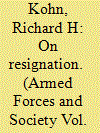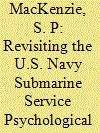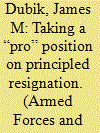|
|
|
Sort Order |
|
|
|
Items / Page
|
|
|
|
|
|
|
| Srl | Item |
| 1 |
ID:
173120


|
|
|
|
|
| Summary/Abstract |
Our research, based on a sample of 500 veterans currently studying at Israeli colleges and universities, suggests that certain aspects of military service are associated with greater entrepreneurial intentions. Specifically, the desire to engage in entrepreneurship is higher among veterans with command experience than veterans without. Similarly, veterans of technological units generally express greater entrepreneurial interest than veterans of combat units. A comparison of commissioned and noncommissioned officers yields curious results and offers a possible direction for further investigation. Although Israel is among the few countries that maintains a mandatory draft, the general applicability of these findings to countries with volunteer forces is discussed.
|
|
|
|
|
|
|
|
|
|
|
|
|
|
|
|
| 2 |
ID:
151013


|
|
|
|
|
| Summary/Abstract |
Arguments in favor of the topmost senior officers exercising “principled resignation” in opposition to policies, decisions, or orders that they find immoral, unethical, or disastrous for the country weaken the military profession and endanger American national security. A member of the Joint Chiefs, a combatant commander, or a topmost war commander who “resigns” would be injecting themselves improperly into a policy role, opposing civilian authority, and undermining civilian control of the military. The act would be politicizing for the military and likely fail to change what the officer opposes. Most importantly, their act of personal conscience would poison civil–military relations long into the future; civilian trust in military subordinates not to undermine support for policies and decisions with the public and other political leaders would decline. Even more than today, they would choose their senior military leaders for compatibility and agreement above other traits.
|
|
|
|
|
|
|
|
|
|
|
|
|
|
|
|
| 3 |
ID:
174842


|
|
|
|
|
| Summary/Abstract |
Conclusions concerning how many World War II U.S. Navy submariners should be classified as psychiatric casualties have long been based on a pioneering study by two navy physicians, Commander Ivan Duff, MD, and Captain Charles Shilling, MD, that was first made public in the Journal of the American Psychiatric Association shortly after the war. This article seeks to show that, despite the longevity of the resulting published figures, there were serious problems in their approach and conclusions. The data set of the study was far from comprehensive, which, in turn, led to erroneous calculations generating a minuscule number—approximately two cases per 1,000 submariners—that in turn necessitated explanatory overreach. Reasons for the approach taken in the original work, and subsequent longevity of acceptance and celebration of the results produced, are then examined through the lens of confirmation bias.
|
|
|
|
|
|
|
|
|
|
|
|
|
|
|
|
| 4 |
ID:
151011


|
|
|
|
|
| Summary/Abstract |
Principled resignation of senior military officers is sometimes justified, especially in wartime. First, except under very narrow circumstances, each of us remains a moral agent. Second, American’s hold those on the battlefield responsible for their decisions and actions, and we must hold senior generals and admirals responsible for strategic decisions and actions taken in capitals. Third, organizations—regardless of type—incur significant risks when senior officials remain silent in the face of serious wrongs. Finally, war risks, damages, changes, and often ends lives of the innocent, of the citizens who fight on behalf of their nation, and of the political community itself, even if the war does not involve an existential threat. Although my colleagues, with companion pieces in this journal, disagree, senior leaders who participate in strategic, war-waging decisions and actions are responsible to speak out, perhaps even to to leave, when the risk involves not just effectiveness but using poorly or wasting life.
|
|
|
|
|
|
|
|
|
|
|
|
|
|
|
|
|
|
|
|
|